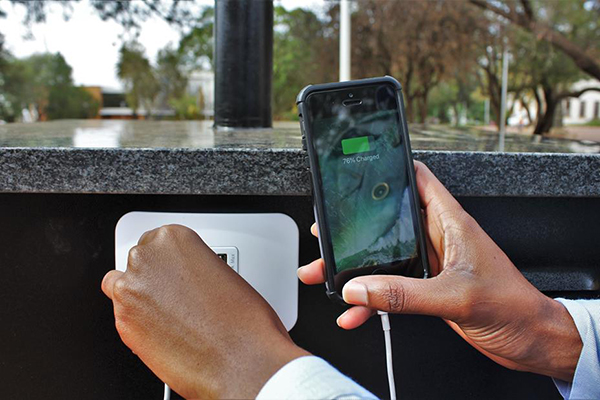Latest News Archive
Please select Category, Year, and then Month to display items
06 April 2018
Photo Rulanzen Martin
 From the left: Dr Thulisile Mphambukeli, leader of the BRICS research team that is exploring the political economy of water and food security, and her research partner, Dr Victor Okorie.
From the left: Dr Thulisile Mphambukeli, leader of the BRICS research team that is exploring the political economy of water and food security, and her research partner, Dr Victor Okorie.
A Brazil, Russia, India, China and South Africa (BRICS) delegation is to hold the 10th Annual BRICS Summit in the last week of May 2018 in Johannesburg. Dr Thulisile Mphambukeli, leader of the University of the Free State (UFS) research team alongside Dr Victor Okorie from the Department of Urban and Regional Planning, in collaboration with Prof Lere Amusan of North-West University, will ensure that water and food security is a prominent feature on the gathering’s agenda.
First, the project titled: “Exploring the political economy of water and food security nexus in BRICS and Africa” will debut at the National Institute for the Humanities and Social Sciences BRICS Think Tank Forum”.
According to Dr Mphambukeli, the key to water security is attitudinal change by means of education and conscientisation. This, she is adamant about, holds the potential to drive behavioural adjustments in the way society interacts with water.
Genetic and social approaches
Dr Okorie asserts that if strides towards reducing the demand for water were to be made, research efforts should be geared towards effecting changes at DNA level. Meaning we need to explore waterwise ways that enable crops and animals to thrive optimally.
The project also looks at social dimensions of water such as flushing a toilet. “Research activities on redesigning toilets, especially the urinal, where more than nine litres of water are used to flush less than one cubic centimetre of urine, are timely in the context of managing water and the food nexus crises,” said Dr Okorie.
Combining the genetic and social approaches would allow us to produce more with a smaller water footprint. This can be made possible by implementing precision agriculture which is about estimating and applying exact quantities of water and nutrients needed for the production of crops or the raising of livestock.
Paradigm shifting policies
Prof Amusan said the team intended to propose functional solutions that take the quality of water into consideration. Equitable production and distribution of water depends on endorsing policies of co-production between citizens, governments and the public sector. BRICS member states mutually consider water and food security as an issue of paramount significance, hence its feature on this prestigious summit’s agenda.
First solar charging station launched at UFS
2017-11-13

Students can now charge their phones at the first solar charging station
on the Bloemfontein Campus.
Photo: Moeketsi Mogotsi
On Friday 10 November 2017, the first solar charging station (600watts) was launched on the Bloemfontein Campus. This unit will be used by students to charge their phones and Ipads. It is the first of nine units to be installed on all three campuses; five on the Bloemfontein Campus and two each on the South and Qwaqwa Campuses.
Team effort results in great outcome
The project was a collaborative effort between the UFS and FCE Consulting Engineers. Coenie van der Merwe, Prototype Design Engineer, played a vital role in designing the charging unit. Anton Calitz, Electrical Engineer in University Estates’ Department of Facilities Management, says, “We are hoping that by the first quarter of 2018, we would have rolled out the remaining eight charging units.”
Project to enhance sustainability and address student needs
Prof Nicky Morgan, former Vice-Rector: Operations, says, “This should be a symbol of affordable opportunities that will both save the planet and enhance financial sustainability.” Nico van Rensburg, Senior Director of University Estates, says, “This renewable energy project is an innovative way of addressing student needs.”
However, students are advised not to charge other electrical appliances at the charging stations besides their phones and Ipads, as this may cause the charging unit to trip.
The UFS was recently awarded for its contribution towards sustainability. This was in recognition of its amazing initiative to install and operate photovoltaic (PV) and greywater systems on all three of its campuses.